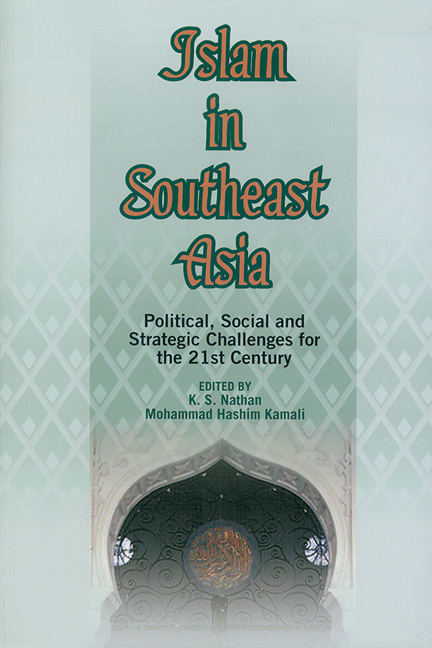Book contents
- Frontmatter
- Contents
- Preface
- Introduction: Understanding Political Islam Post-September 11
- PART ONE ISLAMIC DOCTRINE, HISTORY, GROWTH AND INSTITUTIONS IN SOUTHEAST ASIA
- PART TWO POLITICS, GOVERNANCE, CIVIL SOCIETY AND GENDER ISSUES IN SOUTHEAST ASIAN ISLAM
- 6 Islam Embedded: ‘Moderate’ Political Islam and Governance in the Malay World
- 7 Law-Making in the Name of Islam: Implications for Democratic Governance
- 8 Is It Always Islam versus Civil Society?
- 9 Islamization, Civil Society and Religious Minorities in Malaysia
- 10 Islam and Gender: Reading Equality and Patriarchy
- PART THREE MODERNIZATION, GLOBALIZATION AND THE ‘ISLAMIC STATE’ DEBATE IN SOUTHEAST ASIA
- PART FOUR IMPACT OF SEPTEMBER 11 ON ISLAMIC THOUGHT AND PRACTICE
- CONCLUSION: Addressing the Challenge of Political Islam in Southeast Asia
- Note on Contributors
- About the Editors
- Index
9 - Islamization, Civil Society and Religious Minorities in Malaysia
from PART TWO - POLITICS, GOVERNANCE, CIVIL SOCIETY AND GENDER ISSUES IN SOUTHEAST ASIAN ISLAM
Published online by Cambridge University Press: 03 November 2017
- Frontmatter
- Contents
- Preface
- Introduction: Understanding Political Islam Post-September 11
- PART ONE ISLAMIC DOCTRINE, HISTORY, GROWTH AND INSTITUTIONS IN SOUTHEAST ASIA
- PART TWO POLITICS, GOVERNANCE, CIVIL SOCIETY AND GENDER ISSUES IN SOUTHEAST ASIAN ISLAM
- 6 Islam Embedded: ‘Moderate’ Political Islam and Governance in the Malay World
- 7 Law-Making in the Name of Islam: Implications for Democratic Governance
- 8 Is It Always Islam versus Civil Society?
- 9 Islamization, Civil Society and Religious Minorities in Malaysia
- 10 Islam and Gender: Reading Equality and Patriarchy
- PART THREE MODERNIZATION, GLOBALIZATION AND THE ‘ISLAMIC STATE’ DEBATE IN SOUTHEAST ASIA
- PART FOUR IMPACT OF SEPTEMBER 11 ON ISLAMIC THOUGHT AND PRACTICE
- CONCLUSION: Addressing the Challenge of Political Islam in Southeast Asia
- Note on Contributors
- About the Editors
- Index
Summary
INTRODUCTION
The last three decades of the twentieth century witnessed a fundamental shift in Islamic politics in Malaysia. Islamic resurgence throughout society produced a discernible response at the level of the state directed towards conscious and concerted Islamization through the organs of state. This went hand in hand with a power struggle between the main Muslim political actors in Malaysia. This intra-Muslim struggle concerning the shape of Islamization in Malaysia has had a series of dramatic knock-on effects on religious minority communities in that country.
In this chapter the impact of Islamization in Malaysia, with particular reference to religious minorities will be considered. The various themes addressed will be seen through the eyes of the minorities, as it were.
PERCEPTIONS OF ISLAMIZATION THROUGH NON-MUSLIM EYES
What are the hallmarks of Malaysian Islamization according to the perception of the religious minorities? Several features are key.
Demographics
Recent decades have witnessed verifiable demographic changes in Malaysia which are significant to the Islamization process from the perspective of the religious minorities. The national census taken in the year 2000 showed that the Muslim proportion of Malaysia's population had increased from 58.6 per cent to 60.4 per cent over a ten-year period. The Muslim percentage had been counted as 53 per cent according to the 1980 census, so there had been a rise of 7 per cent in 20 years. In 2000 figures for other religions stood at 19.2 per cent for Buddhism, a significant reduction from the 28 per cent recorded in the census of 1970; 9.1 per cent for Christianity, up from 6.4 per cent in 1980; and 6.3 per cent for Hinduism, down from 7 per cent in 1980.
Though conversion to Islam accounted for some of this change, a greater cause was the changing ethnic composition of Malaysia's population. The 2000 census recorded that Bumiputera — Malays and indigenous tribes in Sarawak and Sabah — constituted 65.1 per cent of the population, up by 4.5 per cent in 10 years, while Chinese represented 26 per cent, down from 28.1 per cent in 1990 and 37 per cent in 1957. As the vast majority of the Bumiputera are Muslim, and the majority of the Chinese are non-Muslims, especially Buddhists, such changes in ethnic composition of the population had a telling effect on the religious mosaic of Malaysia.
- Type
- Chapter
- Information
- Islam in Southeast AsiaPolitical, Social and Strategic Challenges for the 21st Century, pp. 162 - 190Publisher: ISEAS–Yusof Ishak InstitutePrint publication year: 2005



